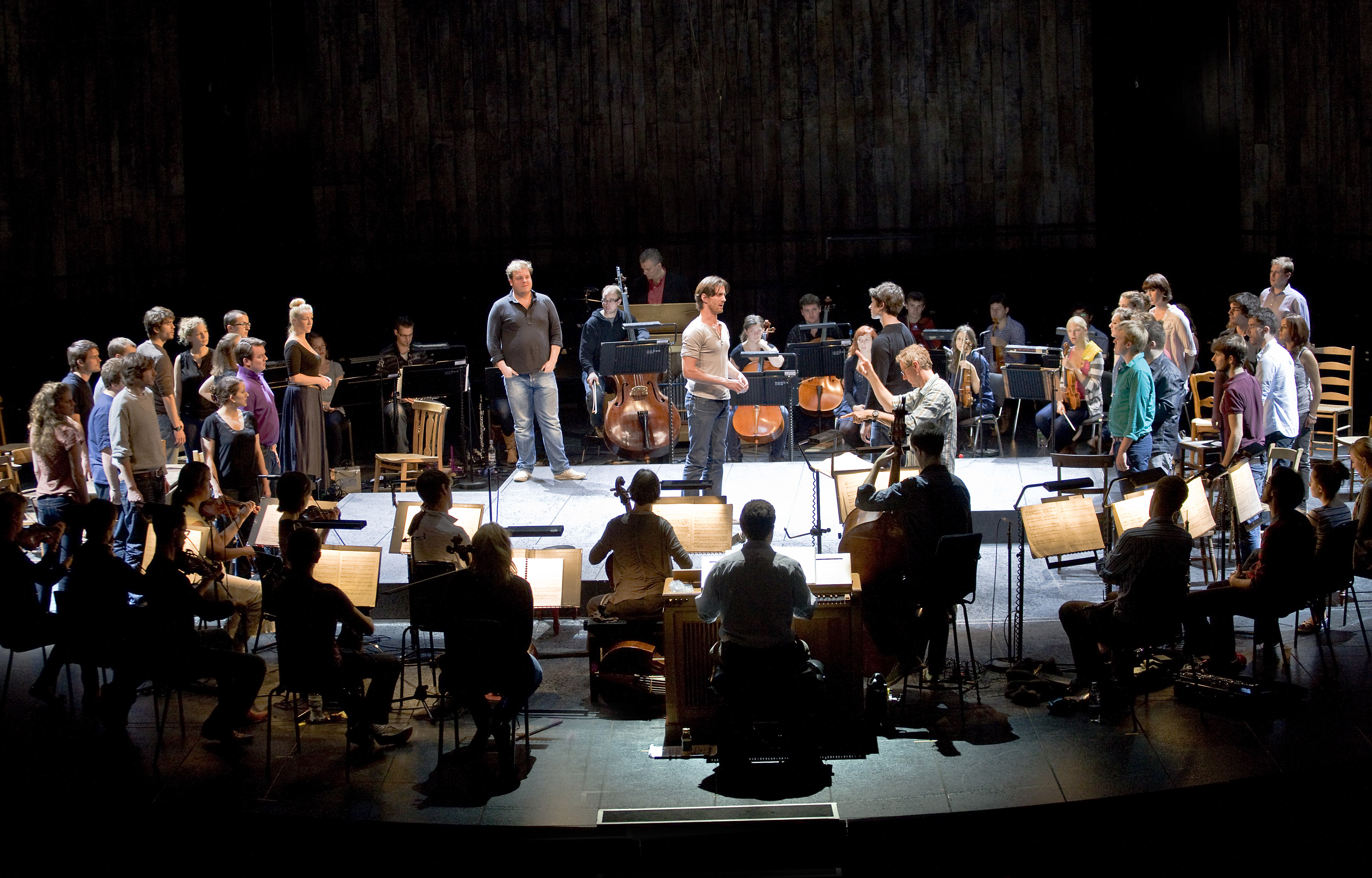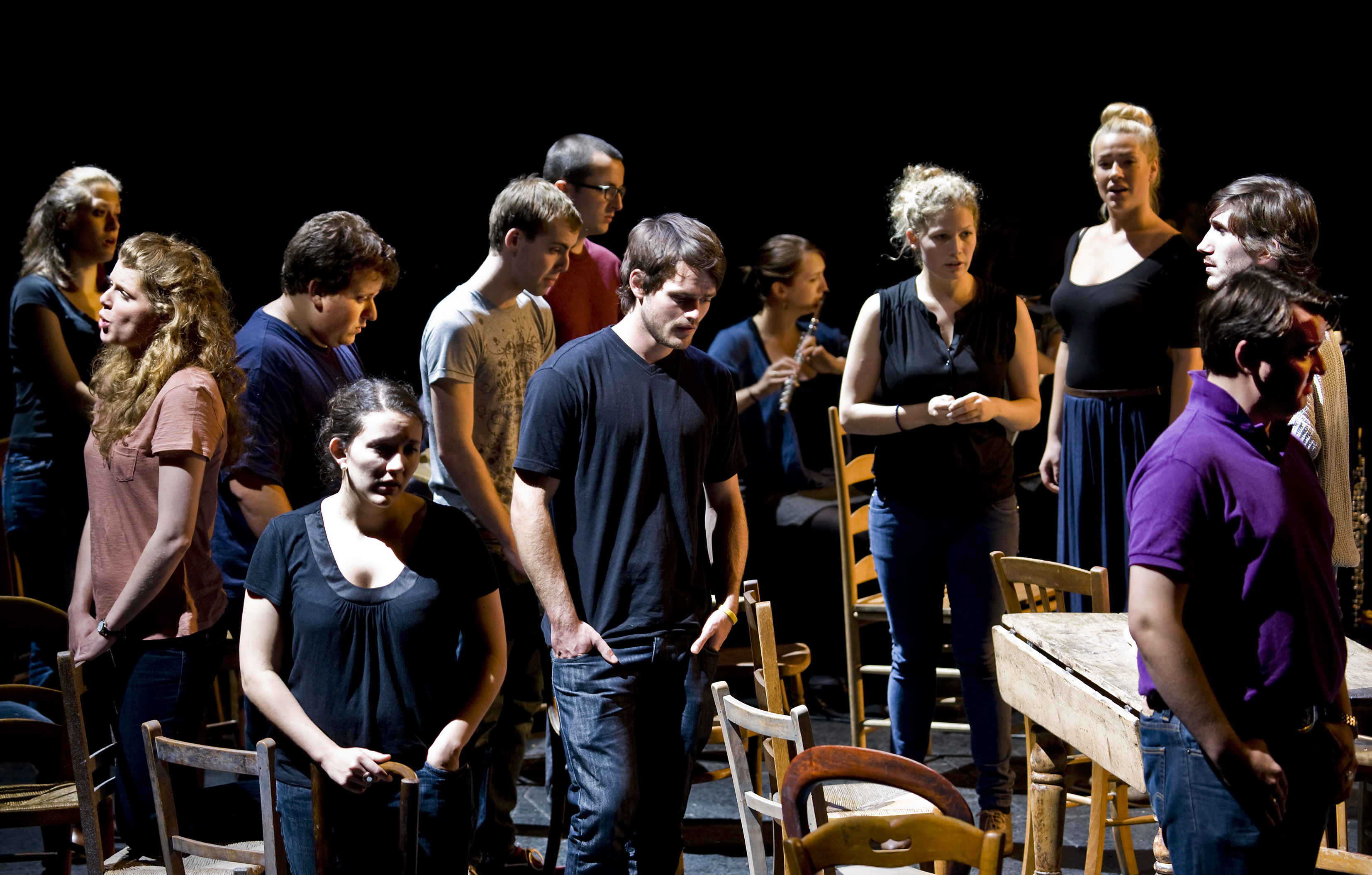St Matthew Passion, National Theatre | reviews, news & interviews
St Matthew Passion, National Theatre
St Matthew Passion, National Theatre
Spirituality for a secular age in Jonathan Miller's original Passion staging

It’s not like we’re short of operas. Thousands of works spanning over 400 years make up the western operatic repertoire. Of these maybe 100 get a regular airing in contemporary opera houses, with only about 20 making it into the popular consciousness. For the rest, a trip outside the archives is rare indeed, with many scores still vainly awaiting their “modern premiere”.
Katie Mitchell raised eyebrows and temperatures with her controversial, post-massacre staging of Bach’s St Matthew Passion at Glyndebourne in 2007. In 2000 Deborah Warner provoked only slightly less debate with her St John Passion for English National Opera. Predating both of these however was Jonathan Miller’s take on the St Matthew, originally seen in 1993 at Holy Trinity Church, Sloane Street. The production has since visited America, but now returns to the UK and a very different venue.
Andrew Staples’ Evangelist exposes a humanity Bach denies us
In place of Holy Trinity’s intimate, sacred space we now have the National’s Olivier Theatre – large, acoustically challenging and emphatically secular. While Mitchell’s secularised staging still maintains a foothold in the visual iconography of religion, Miller strips his altars completely bare, leaving us with a young un-costumed cast, a ragged collection of chairs and a kitchen table. Placeless and timeless, Miller runs the very real risk of his production being soulless as well.
 What saves it are Miller’s young performers, both the players of the Southbank Sinfonia and the dramatically mature chorus of singers from the Guildhall School of Music and Drama. Impersonating a period band with uncanny success (and with the help of the Retrospect Trio’s Matthew Truscott and Poppy Walshaw’s gamba), the orchestra sets the tone with delivery that is light but never casual, intimate without being mannered.
What saves it are Miller’s young performers, both the players of the Southbank Sinfonia and the dramatically mature chorus of singers from the Guildhall School of Music and Drama. Impersonating a period band with uncanny success (and with the help of the Retrospect Trio’s Matthew Truscott and Poppy Walshaw’s gamba), the orchestra sets the tone with delivery that is light but never casual, intimate without being mannered.
Circled around the central performing space, the instrumentalists (and audience members seated at the back of the set) remind us that this isn’t so much a staging as an enactment of Bach’s Passion. In theory this makes sense, but in practice facing the backs of musicians while behind them some action (glimpsed around the neck of a double bass) takes place isn’t ideal. Seemingly unwilling to react to criticism from previous performances, Miller still has his two choruses singing across the stage at one another. While this offers a dynamic, spatialised take on Bach’s crowd scenes, it also means that the vernacular words are often obscured and (in one climactic chorus) the ensemble all but collapses as none of the singers are permitted to face conductor Paul Goodwin.
 If it seems petty to harp on the practicalities where such big spiritual concerns are at stake it’s because they matter. If Bach’s musical drama is subordinated by or lost among Miller’s visuals then the work’s justification, its hope of reaching deeper, further, more vividly into Bach’s sacred drama has failed. The chorus seem to understand this, their individual commitment to characterisation and unshowy singing bringing us ever back to an emotional authenticity. Andrew Staples’ Evangelist likewise, a narrator whose relationship to the action is generally unclear, exposed a humanity Bach denies us. I’ve heard smoother, more lovely deliveries of the role, but the point here was directness, uncovering the speaker’s stake in the action that unfolds in front of him. This Staples achieved with absolute conviction – a still point of authority among the fragmented, democratic mass of bodies on stage.
If it seems petty to harp on the practicalities where such big spiritual concerns are at stake it’s because they matter. If Bach’s musical drama is subordinated by or lost among Miller’s visuals then the work’s justification, its hope of reaching deeper, further, more vividly into Bach’s sacred drama has failed. The chorus seem to understand this, their individual commitment to characterisation and unshowy singing bringing us ever back to an emotional authenticity. Andrew Staples’ Evangelist likewise, a narrator whose relationship to the action is generally unclear, exposed a humanity Bach denies us. I’ve heard smoother, more lovely deliveries of the role, but the point here was directness, uncovering the speaker’s stake in the action that unfolds in front of him. This Staples achieved with absolute conviction – a still point of authority among the fragmented, democratic mass of bodies on stage.
While soloists Mark Stone, James Laing and Sally Bruce-Payne all worked well within the ensemble, soprano Ruby Hughes struggled. The lack of clarity in her diction bled into the drama of her performance which felt muffled and oddly indirect. Hadleigh Adams’ Jesus likewise rather missed the mark. Seemingly cast for his (admittedly very appropriate) appearance, his problematic tuning and the rather too stagy approach to emotion failed to square with the muted naturalism of the production.
All Miller’s gestures – visually connecting obbligato instrumentalists and their soloists, giving the chorus members individual identities, engaging the Evangelist physically in the action – feel right, feel as though they might yield something true and important. The trouble is that they never quite follow through and deliver. Perhaps given a proper Passiontide context, as an antithesis to the Bach Choir’s annual heavyweight Passion at the Royal Festival Hall, this chamber staging might come into its own; but on a sunny Sunday afternoon in September it just didn’t quite carry the weight of its many convictions.
- St Matthew Passion at the Olivier Theatre until 2 October
The future of Arts Journalism
You can stop theartsdesk.com closing!
We urgently need financing to survive. Our fundraising drive has thus far raised £49,000 but we need to reach £100,000 or we will be forced to close. Please contribute here: https://gofund.me/c3f6033d
And if you can forward this information to anyone who might assist, we’d be grateful.

Subscribe to theartsdesk.com
Thank you for continuing to read our work on theartsdesk.com. For unlimited access to every article in its entirety, including our archive of more than 15,000 pieces, we're asking for £5 per month or £40 per year. We feel it's a very good deal, and hope you do too.
To take a subscription now simply click here.
And if you're looking for that extra gift for a friend or family member, why not treat them to a theartsdesk.com gift subscription?

Add comment